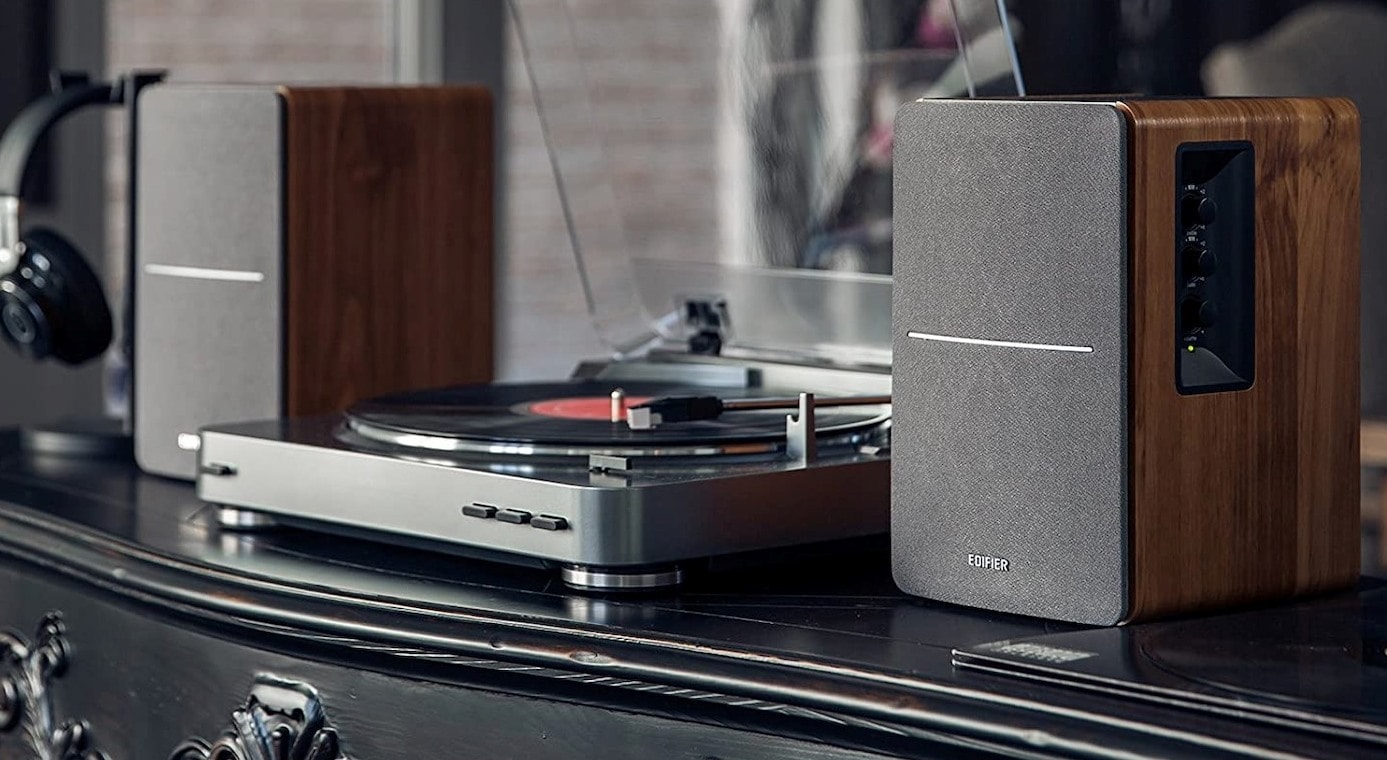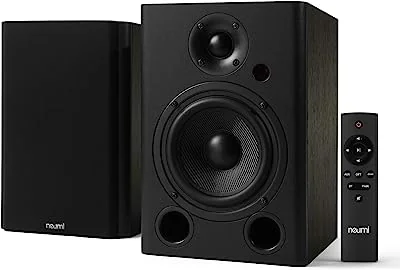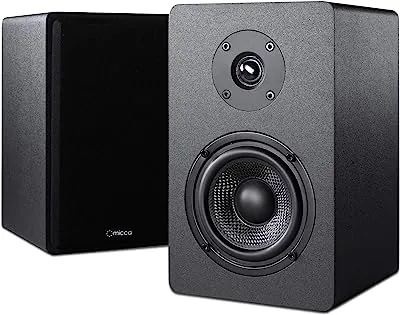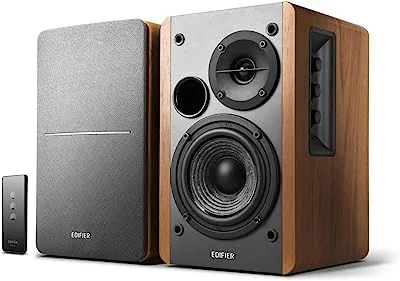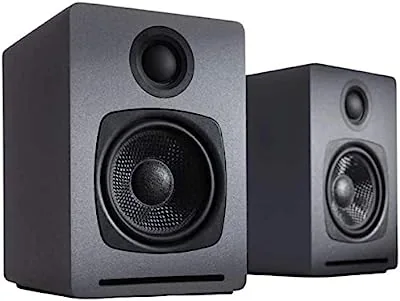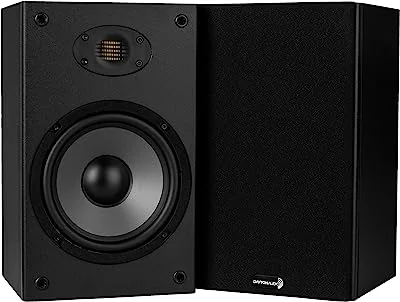So the other day I was listening to “The New Music Business” podcast by Ari Herstand and he was talking about how vinyl sales are making a comeback. And honestly, I wasn't even surprised. Not only do fans love the artwork, but vinyl just sounds way better.
It's not just my opinion either - they've actually done studies on how people emotionally respond to different frequency ranges. One of these is "warmth" - which is basically a combo of low-mid bumps and smoothed-out highs.
Vinyl and reel-to-reel tape both have a way of pleasantly saturating these frequencies and creating that warm response. And the good news is, you don't really need fancy speakers to hear these details - some consumer speakers will do the trick.
If you're looking for some budget speakers that really excel for turntables and look great too, here are a few of my faves.
5 Best Budget Speakers for Turntables
1. NEUMI BSSP
Let's talk about the NEUMI BSSP bookshelf speakers. They look super professional, kind of like PMC or ATC speakers. They'll fit right in with your turntable setup. They've got 75 watts of power and a 5-inch woofer, so they're great for smaller rooms, but they can also handle medium-sized rooms with good acoustics.
What I really like about these speakers is their neutral sound. I can't stand hyped-up speakers when I'm listening to mastered mixes, especially when I'm listening to vinyl. I want the most natural and uncolored sound possible.
Vinyl is already mastered by some top-notch professional engineers. To cut the lacquer of the vinyl, they have to balance the lows just right. If you play vinyl through hyped-up studio monitors, you could end up making the sound muddy by bumping up too many low mids.
But the BSSP speakers are great at translating that vinyl phase distortion, which is the good stuff we all love about vinyl records, right?
These speakers have some sweet input choices, too. You can choose from digital options like coaxial and optical inputs or classic turntable phono inputs. And if you're into streaming, they even have Bluetooth. They're pretty modern and super versatile.
The only thing that kind of bums me out about these speakers is their sub-frequency range. Even though they're 5-inch speakers, they cut off at 50 Hz, which is a bit limiting for some of today's hip-hop vinyl cuts. It's not ideal, but they're still a solid choice for most vinyl recordings, especially the classics.
2. Micca PB42X
These little speakers from Micca might catch you off guard at first because they have a 4” woofer and a smaller tweeter. But the difference is that they have a carbon fiber design that's great at making tighter bass sound amazing.
Carbon fiber cone designs lessen some of the low harmonics produced by subs but still deliver even more punch than some speakers that go lower in specs. They act like some transformer designs in pro audio, bringing low subs below 60hz back as harmonics. Pretty cool, huh?
This is especially great for Vinyl playback as it enhances that pleasant Low Harmonic Distortion without the mud. I personally love that even for my studio reference speakers. The Dynaudio BM5As have a similar design. These Micca speakers are perfect for bookshelf speakers for any turntable setup.
The PB42X have the classic turntable phono input and a headphone-style 3.5mm input. They don't have digital inputs though. It's an interesting choice of inputs but not very future-proof. It almost sets these as below professional or even audiophile and strictly an average consumer speaker.
Yes, they can still work for Vinyl, but the reason coaxial or optical inputs are great is for more modern turntable designs. The advantage of digital transfers is that they won’t over peak and distort. They will just transfer a faithful rendition of the fully mastered vinyl sound.
They also do this a lot cleaner because there are no grounding issues with the RCA phono cables. That can be a real problem with some turntables. You also run into the issue of having to buy high-quality phono cables to compensate, bringing up your overall costs.
3. Edifier R1280T
Okay, so the Edifier R1280T are all about the looks. They have a sweet retro mid-century design that's perfect for all you hipsters out there!
Plus, they have some pretty useful tone control knobs that you can use to finely tune your sound to your room. They have a range of +6 to -6dB, which was a smart move on their part since the frequency range is pretty limited at 75Hz-18kHz. Not the greatest specs ever, but let's be real - these speakers are just for consumers, not pros.
To drive that point home, they added two aux phono RCA jack inputs that work at the same time, so you don't have to switch between them. You can have two stereo sources of audio plugged in at once, plus the classic speaker cable inputs.
Now, you might be thinking, "Wait a minute, you said you love extended bass ranges in speakers and hate artificially hyped monitors - so why are these on the list?" Well, the truth is, I think these are pretty good speakers that were designed specifically for turntable enthusiasts. The design is important, and the fact that they sound good (even if the range is limited) might be worth it for some people.
In Japan, they have bars where you can listen to vinyl while sipping on some fancy scotch. The design, ambiance, and vibe of those bars are all part of the experience - and these speakers can add to your home experience too. They're just cool.
Oh, and it's also a plus that they come with the classic thread speaker cable because a lot of vintage turntables use that as their main output source. Plus, these little monitors are well-powered. When you consider how much you'd have to pay for an extra amplifier to power older turntables, having powered speakers like these might just be worth it.
4. Audioengine A1
If you're trying to get the closest thing to audiophile speakers without breaking the bank, the Audioengine A1 Bluetooth bookshelf speakers are where it's at. These things pack a punch, despite being more compact than your average monitor.
They focus on the highs with a silky smooth 65hz-22khz frequency range, but let's be real, they're not exactly bass-heavy. Luckily, they were smart enough to add a subwoofer connection, so if you're looking for more low end, just pair it with a dedicated sub.
And get this: they support Bluetooth 5.0 and can connect up to 100 feet away. Perfect for those big living rooms where you don't want to be tethered to one spot. It can also be a great solution for more modern, minimalist setups that want to have the least amount of cable clutter possible. Bluetooth 5.0 is incredibly reliable and has very few sonic errors compared to previous streaming methods.
Plus, they're specifically designed for turntables with a classic phono input and threaded speaker cable. And let's not forget about the importance of customer support. Audioengine is based in Austin, TX, so if you happen to run into any issues, you won't have to wait forever for a response.
Now, the one thing that's a bit of a bummer is that if you use them digitally, they're only 16 bit. That's not terrible, but it's definitely not cutting edge. Other companies are streaming at 24 bit and even 96kHz sample rate, so that's a bit disappointing.
5. Dayton Audio B652 Air
The Dayton Audio B652 Air have a special ribbon tweeter technology that makes the high frequencies sound clearer and wider. This type of tweeter is super effective at giving you that nice top sheen or "air" that mastering engineers are always talking about.
I first heard pleated ribbon tweeters in the ADAM Audio line of monitors and was blown away. They've got this natural hifi sound that's crisp and detailed without being harsh. Dayton definitely has an edge over other similar turntable speakers by using this type of tweeter.
When you're listening to vinyl through speakers with high-quality tweeters, you get all that beautiful harmonic phase distortion that vinyl mastering is famous for.
Plus, these monitors have 6.5" woofers that can deliver some punchy deep bass. So, you've got a killer combo that makes these perfect as audiophile vinyl monitors as well as options for nearfield studio monitors.
Unfortunately, these are passive monitors, so you'll need an additional amplifier to power them. That's kind of a bummer because I feel like ribbon tweeters vary greatly in quality depending on what amp you use.
These passive speakers are usually paired with the Nobsound Mini Amplifier. It's pretty dope and reminds me of some of the Apogee sound cards I've seen. It's got several input options, including Bluetooth, Banana plugs for passive speakers, and even USB to be used as your main sound card.
Overall, it's a solid little amp and even has an Apogee-style volume knob on top, which is a cool touch. The only downside is that it has a limited 50w per side power distribution. For a smaller room turntable setup, though, it could be a great choice and looks pretty sick as an audiophile setup.
Choosing the Right Turntable Speakers
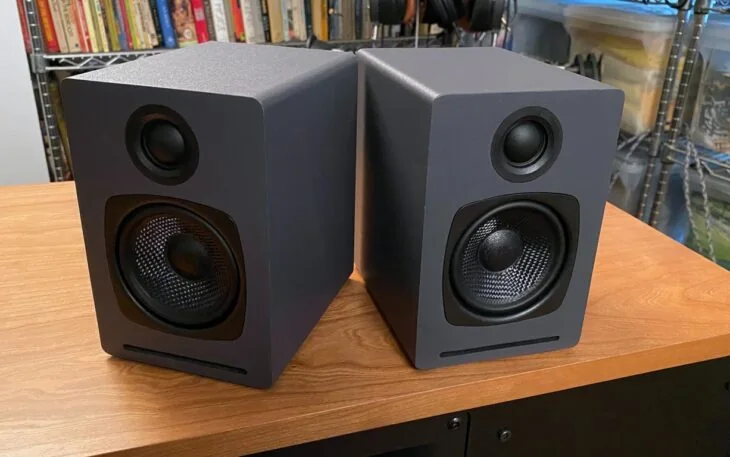
Alright, if you want to enjoy vinyl like a true audiophile, there are a few things you need to keep in mind. Obviously, you need a good turntable and stylus, but speakers are just as important.
The key to great vinyl is in the mastering of the lacquer. When I've had vinyl pressed, I've found that the low frequencies are what separate the pros from the amateurs. You need to get the groove depth just right to print those lows correctly. So, for me, speakers that can deliver clear low mids and lows are the real secret to a true vinyl setup.
Now, don't get me wrong, highs are important too, but they usually sound pretty good across the board. That being said, the better the tweeter, the better the overall sound.
So, here are the three things I always look for in turntable speakers:
Design
When it comes to setting up your bookshelf turntable, there are a few things to keep in mind to make sure you're inspired. The design and specs are both important - think of your setup like an instrument that needs to look and feel a certain way to motivate and uplift you.
People love vinyl because it's such a unique and engaging experience. You get to load your record, drop the needle, sit back and take in the artwork. It's not just about the sound - the experience matters too, and that includes how everything looks and feels.
Personally, I think the best kind of speakers are the ones that let you take off the front grill with magnets. That way, you can have a more traditional look or a more professional reference speaker style, depending on what you like. With the right setup, you can get the most out of your vinyl collection and enjoy every aspect of it.
Power

Most nightclubs have moved on to other formats, but vinyl is still the way to go for home listening or chillin' at a smaller bar. You gotta have some good monitors though, no doubt. It's not just about the volume, but the bass needs to be crisp and punchy for that top-notch sound.
When you're picking out speakers for your space, don't just focus on the size of the woofer. The amplifier you use can make a huge difference in the overall quality. I've seriously heard passive speakers sound totally different when powered by different amps.
The power of the amplifier can really affect how tight the bass is, which is super important when you're playing vinyl and trying to get that warmth in the low mids. So take a good look at the amp specs before you make your final decision, and you'll be well on your way to optimal performance.
Connectivity
If you want to connect your speakers, there are many options available nowadays. From Bluetooth to USB to aux headphone-style inputs, you have plenty of ways to get your sound going. However, bare wire options are still a good choice for speakers.
Speaking of old-school, some of the vintage Technics turntables are still some of the best out there and highly sought after by collectors. Of course, at the end of the day, it all depends on your personal setup and what you're looking for in terms of sound quality.
Regardless of your preferences, I recommend having a variety of connection options. Digital connections provide a cleaner signal that brings out the nuances and details of vinyl recordings with lower noise. So whether you're into vinyl or just looking for a versatile setup, having more options is always a good thing.
Final Thoughts
Personally, I have two sets of turntables. One is in my studio for sampling from vinyl records into my DAW and Akai MPC. The other one is at home with an audiophile setup and Bluetooth streaming connectivity.
Honestly, I prefer listening to vinyl on my home setup with consumer speakers like the ones on this list. Whenever I listen to vinyl through my studio mixing monitors, I feel like there's too much bass and low mids. Sometimes, there's too much wow and flutter that comes through.
Wow and flutter are just fancy words for when the vinyl starts to warp due to use, heat, and age. It can actually sound pretty cool, but not through ultra-detailed mixing reference monitors.
So, my advice is to go for an audiophile setup with beautiful-looking monitors, even if they are on the cheaper side. It's a sweet spot type of compromise. You'll get less low-end detail, more forgiving high-end transients, and a nice bookshelf look.
Then, you can fully enjoy the experience of looking at the artwork, the lyrics, the liner notes, and listening to a less overwhelming, smoother environment. It's the best of all worlds. I think the fact that good value monitors like these exist has been one of the factors for the vinyl sale resurgence, and personally, I couldn't be happier.

